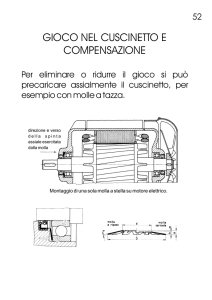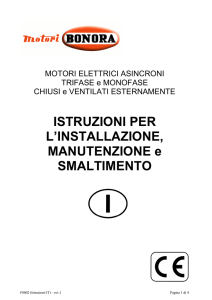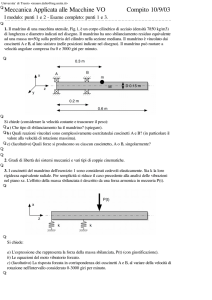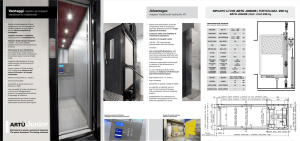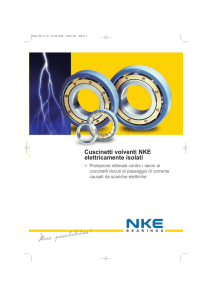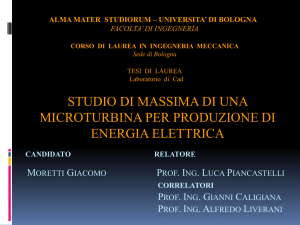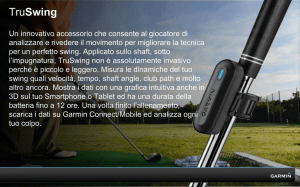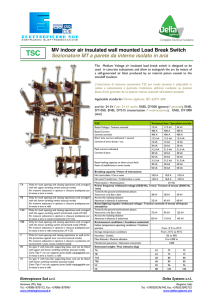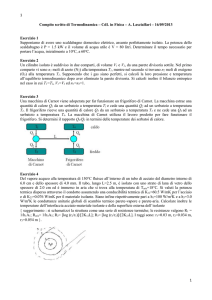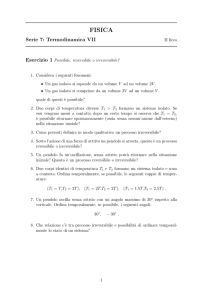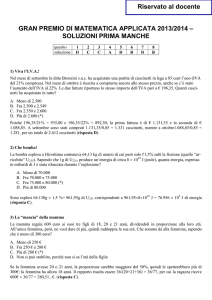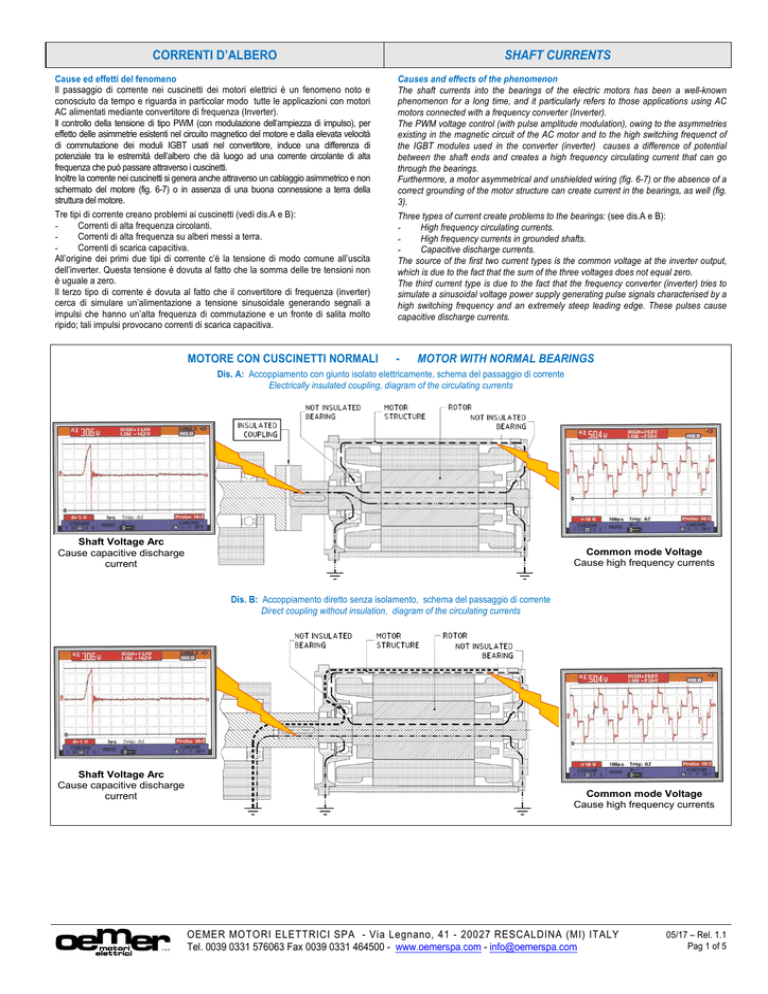
CORRENTI D’ALBERO
Cause ed effetti del fenomeno
Il passaggio di corrente nei cuscinetti dei motori elettrici è un fenomeno noto e
conosciuto da tempo e riguarda in particolar modo tutte le applicazioni con motori
AC alimentati mediante convertitore di frequenza (Inverter).
Il controllo della tensione di tipo PWM (con modulazione dell’ampiezza di impulso), per
effetto delle asimmetrie esistenti nel circuito magnetico del motore e dalla elevata velocità
di commutazione dei moduli IGBT usati nel convertitore, induce una differenza di
potenziale tra le estremità dell’albero che dà luogo ad una corrente circolante di alta
frequenza che può passare attraverso i cuscinetti.
Inoltre la corrente nei cuscinetti si genera anche attraverso un cablaggio asimmetrico e non
schermato del motore (fig. 6-7) o in assenza di una buona connessione a terra della
struttura del motore.
Tre tipi di corrente creano problemi ai cuscinetti (vedi dis.A e B):
Correnti di alta frequenza circolanti.
Correnti di alta frequenza su alberi messi a terra.
Correnti di scarica capacitiva.
All’origine dei primi due tipi di corrente c’è la tensione di modo comune all’uscita
dell’inverter. Questa tensione è dovuta al fatto che la somma delle tre tensioni non
è uguale a zero.
Il terzo tipo di corrente è dovuta al fatto che il convertitore di frequenza (inverter)
cerca di simulare un’alimentazione a tensione sinusoidale generando segnali a
impulsi che hanno un’alta frequenza di commutazione e un fronte di salita molto
ripido; tali impulsi provocano correnti di scarica capacitiva.
MOTORE CON CUSCINETTI NORMALI
SHAFT CURRENTS
Causes and effects of the phenomenon
The shaft currents into the bearings of the electric motors has been a well-known
phenomenon for a long time, and it particularly refers to those applications using AC
motors connected with a frequency converter (Inverter).
The PWM voltage control (with pulse amplitude modulation), owing to the asymmetries
existing in the magnetic circuit of the AC motor and to the high switching frequenct of
the IGBT modules used in the converter (inverter) causes a difference of potential
between the shaft ends and creates a high frequency circulating current that can go
through the bearings.
Furthermore, a motor asymmetrical and unshielded wiring (fig. 6-7) or the absence of a
correct grounding of the motor structure can create current in the bearings, as well (fig.
3).
Three types of current create problems to the bearings: (see dis.A e B):
High frequency circulating currents.
High frequency currents in grounded shafts.
Capacitive discharge currents.
The source of the first two current types is the common voltage at the inverter output,
which is due to the fact that the sum of the three voltages does not equal zero.
The third current type is due to the fact that the frequency converter (inverter) tries to
simulate a sinusoidal voltage power supply generating pulse signals characterised by a
high switching frequency and an extremely steep leading edge. These pulses cause
capacitive discharge currents.
-
MOTOR WITH NORMAL BEARINGS
Dis. A: Accoppiamento con giunto isolato elettricamente, schema del passaggio di corrente
Electrically insulated coupling, diagram of the circulating currents
Shaft Voltage Arc
Cause capacitive discharge
current
Common mode Voltage
Cause high frequency currents
Dis. B: Accoppiamento diretto senza isolamento, schema del passaggio di corrente
Direct coupling without insulation, diagram of the circulating currents
Shaft Voltage Arc
Cause capacitive discharge
current
Common mode Voltage
Cause high frequency currents
OEMER MOTORI ELETTRICI SPA - Via Legnano, 41 - 20027 RESCALDINA (MI) ITALY
Tel. 0039 0331 576063 Fax 0039 0331 464500 - www.oemerspa.com - [email protected]
05/17 – Rel. 1.1
Pag 1 of 5
CORRENTI D’ALBERO
SHAFT CURRENTS
Schema del motore
Diagram of the motor
Il motore può essere schematizzato in tre parti:
The motor can be divided into three diagrams:
Struttura:
Componente elettromeccanico composto da pacco lamellare o carcassa, coperchi,
avvolgimento all’interno del quale ruota il rotore.
Structure:
Electromechanical component formed by laminated stator or frame, covers, winding
system inside of which the rotor revolves.
Rotore:
Componente meccanico composto dall’albero e dal rotore sostenuto all’interno
della struttura del motore mediante i cuscinetti.
Rotor:
Mechanical component formed by the shaft and the rotor supported by the bearings
inside the motor structure.
Cuscinetti:
Componente meccanico composto dall’anello interno, dalle sfere, dall’anello
esterno e dalla gabbia di separazione delle sfere.
Bearings:
Mechanical component formed by the inner ring, the balls, the outer ring and the balls’
separation cage.
La struttura del motore è normalmente ben collegata verso massa sia tramite gli
appositi conduttori di terra che attraverso i punti di fissaggio (piedi e/o flangia).
The motor structure is usually well grounded both by means of the specific earth wires
and by means of the attachment points (feet and/or flange).
Il rotore invece non ha un collegamento diretto verso massa poiché è sostenuto
solo dai cuscinetti (non esiste un vero punto di contatto fisso).
On the contrary, the rotor is not grounded directly because it is supported only by the
bearings (a real fixed contact point does not exist).
Il cuscinetto “collega meccanicamente” il rotore con la struttura del motore solo
mediante le sfere che hanno una superficie di contatto diretto con le piste
estremamente ridotta.
Inoltre tra le sfere e le piste si interpone un sottilissimo strato di lubrificante che è
elettricamente isolante.
Pertanto la differenza di potenziale esistente tra la struttura del motore ed il rotore
può generare una corrente che necessariamente deve transitare attraverso le sfere
e le piste del cuscinetto.
Il deterioramento conseguente potrebbe avvenire in tempi molto brevi (pochi mesi di
funzionamento) compromettendo l’affidabilità dell’impianto.
The bearing “mechanically connects” the rotor to the motor structure only by means of
the balls having an extremely small surface in direct contact with the tracks.
Furthermore, between the balls and the tracks there is an extremely thin layer of
lubricant that is electrically insulating.
As a consequence, the difference of potential existing between the motor structure and
the rotor can create a current that has necessarily to pass through the balls and the
tracks of the bearing.
The consequent deterioration could occur very soon (after few months of operation),
compromising the reliability of the installation.
Normalmente questo problema si riscontra solo in macchine relativamente grosse
(oltre i 75kW) ed è strettamente legato a molteplici fattori quali lunghezza dei cavi,
tipo di collegamento di massa, frequenza di commutazione dell’inverter, tipo di
supporto del motore, tipo di cavo di alimentazione e relativa schermatura.
L’effetto che il passaggio di corrente genera nei cuscinetti si riassume in un
deterioramento precoce della superficie delle sfere e delle piste di rotolamento.
Infatti, a seguito del passaggio di corrente, nelle zone in cui avvengono i contatti fra
i corpi volventi e le piste (fig. 1) si sviluppa calore che provoca fusioni localizzate
delle superfici. In tali zone si formano crateri e particelle di materiale fuso che si
staccano ed in parte si frantumano.
Le superfici danneggiate appaiono opache e caratterizzate da puntinature e
piccolissimi crateri visibili con microscopio (fig. 2).
Sulle piste di rotolamento si notano segni perpendicolari al senso di rotazione
causati dalla vibrazione meccanica di risonanza delle sfere quando passano sui
piccoli crateri (fig. 3).
Le scariche di corrente provocano anche un rapido degrado del grasso lubrificante.
L’elevata temperatura generata fa reagire tra loro l’olio base e gli additivi e ne provoca la
carbonizzazione e l’indurimento (fig. 4).
This problem usually occurs only in quite powerful machines (more than 75kW) and it is
strictly connected to several factors, such as length of the cables, type of grounding
connection, inverter switching frequency, type of motor support and installation, type of
power supply cable and its shielding.
The effect created by the presence of current in the bearings is a premature
deterioration of the bearings in particular on the surface of balls and roll tracks.
Indeed, in the areas where the rolling bodies and the tracks (fig. 1) come into contact,
heat develops as a consequence of the presence of current, and it causes localised
melting of the surfaces. In such areas, there are craters and melted material particles
that detach and partly break into pieces.
The damaged surfaces are opaque, characterised by pricks and extremely small
craters that can be seen with a microscope (fig. 2).
The mechanical resonance vibration of the balls passing on the small craters (fig. 3)
causes some signs in the roll tracks, which are perpendicular to the rotation direction.
Current discharges also cause a quick deterioration of the lubricating grease. The high
temperature makes the base oil react with the additives, causing carbonisation and
hardening (fig. 4).
Cuscinetto danneggiato dal passaggio di corrente
–
Damaged bearing due to the shaft currents
Fig. 1
Fig. 2
Fig. 3
Fig. 4
Schema – drawing
Sfere – Balls
Pista - Row
Grasso - Grease
Cavo schermato simmetrico Fig. 5
Shilded symmetrical calbe
Cavo simmetrico non schermato Fig. 6
Symmetrical cable
Cavo asimmetrico (non adatto) Fig. 7
Asymmetrical cable
OEMER MOTORI ELETTRICI SPA - Via Legnano, 41 - 20027 RESCALDINA (MI) ITALY
Tel. 0039 0331 576063 Fax 0039 0331 464500 - www.oemerspa.com - [email protected]
05/17 – Rel. 1.1
Pag 2 of 5
CORRENTI D’ALBERO
SHAFT CURRENTS
Soluzioni e rimedi
Per risolvere il problema della trasmissione delle correnti d’albero ai cuscinetti del
motore ed agli organi meccanici condotti, sono disponibili a richiesta due soluzioni
concettualmente opposte.
Queste opzioni devono essere richieste al momento dell’ordine poiché non è
possibile (o è difficoltoso) equipaggiare il motore con queste opzioni dopo la sua
costruzione.
Solutions and remedies
In order to solve the problem relating to the transmission of shaft currents to the motor
bearings and to the driven mechanical devices, two conceptually opposite solutions are
available on demand.
These options have to be requested when ordering, because it is not possible (or it is
difficult) to equip the motor with them after it has been manufactured.
Cuscinetto isolato elettricamente
Ha lo scopo di aprire il circuito elettrico esistente tra il rotore e la struttura del
motore evitando che le correnti d’albero circolino attraverso i cuscinetti.
Il cuscinetto isolato elettricamente è montato normalmente sul lato posteriore del
motore (consigliamo l’adozione di un solo cuscinetto isolato) ed è composto da un
cuscinetto a sfere con anello esterno rivestito in materiale ceramico isolante.
Il rivestimento dell’anello esterno è realizzato con riporto di ossido di alluminio che
assicura una tensione di rottura pari a 1000V ed una resistenza di 50Mohm. Nelle
applicazioni con inverter PWM si deve considerare l’impedenza del rivestimento
ceramico. L’impedenza rappresenta la relazione tensione-corrente ed il suo valore
dipende principalmente da due caratteristiche elettriche del rivestimento: la
resistenza ohmica e la reattanza capacitiva.
Electrically insulated bearing
Its purpose is to open the electric circuit existing between the rotor and the motor
structure, preventing that the shaft currents go through the bearings.
The electrically insulated bearing is a ball-bearing with an outer ring that is coated with
insulating ceramic material. It is usually assembled in the rear side of the motor (it is
recommended to use a single insulated bearing).
The outer ring is coated with aluminium oxide ensuring a breaking stress equalling
1000V and a resistance equalling 50Mohm. In the applications made with a PWM
inverter, it is necessary to consider the impedance of the ceramic coating. The
impedance represents the voltage-current relationship and its value mainly results from
two electrical features of the coating: the ohmic resistance and the capacity reactance.
Per contrastare gli effetti delle correnti ad alta frequenza quest’ultima deve essere
la più piccola possibile. L’impedenza del rivestimento di ossido di alluminio può
essere configurata come una connessione in parallelo di un resistore e di un
condensatore.
In order to resist the effects of the high frequency currents, the frequency has to be the
smallest as possible. The impedance of the aluminium oxide coating can be configured
as a parallel connection of a resistor and a capacitor.
Anello o Spazzola per scarico correnti d’albero
Ha lo scopo di chiudere il circuito elettrico esistente tra il rotore e la struttura del
motore consentendo il passaggio delle correnti d’albero tramite la spazzola e non
attraverso i cuscinetti.
Shaft current discharge brush or ring
Its purpose is to close the electric circuit existing between the rotor and the motor
structure, allowing the shaft currents to pass through the brush and not in the bearings.
La spazzola di scarico correnti d’albero mette in contatto diretto il rotore con la
struttura del motore creando una via preferenziale per il passaggio delle correnti di
rotore.
The shaft current discharge brush puts the rotor in direct contact with the motor
structure, creating a preferential way for the passage of the rotor currents.
If the motor is equipped with a transducer (Encoder), also the driving shaft will have to
be electrically insulated.
Se il motore è provvisto di trasduttore (Encoder) anche l’albero di trascinamento
deve essere isolato elettricamente.
SKF INSOCOAT
AEGIS
Cuscinetto isolato elettricamente
Anello per scarico correnti
Electrically insulated bearing
Shaft grounding ring
Note:
Per macchine di potenza inferiore o uguale a 75kW l'adozione di 1
spazzola od anello scarico correnti (solitamente sul lato posteriore - NDE)
è sufficiente a garantire un buon funzionamento mentre per macchine di
potenza superiore a 75 kW è consigliabile mettere 1 spazzola (solitamente
lato comando DE) e 1 cuscinetto isolato sul lato opposto (solitamente lato
posteriore NDE).
Spazzola scarico correnti albero
Brush for shaft currents discharge
Notes:
The adoption of a single brush for shaft current discharge or a single shaft grounding
ring (usually on the rear side of the motor - NDE) is enough to ensure the proper
functioning of motors with power level lower or equal to 75 kW while, for motor with a
power level higher than 75 kW, it is recommended to install 1 brush for shaft current
discharge (usually on the DE side) and 1 electrically insulated bearing on the opposite
side (usually on the rear side - NDE).
OEMER MOTORI ELETTRICI SPA - Via Legnano, 41 - 20027 RESCALDINA (MI) ITALY
Tel. 0039 0331 576063 Fax 0039 0331 464500 - www.oemerspa.com - [email protected]
05/17 – Rel. 1.1
Pag 3 of 5
Efficacia delle contromisure per correnti nei cuscinetti - Effectiveness of bearing current countermeasures
Contro Misura
Counter Measure
Una spazzola/anello NDE
(senza cuscinetto isolato)
One earthing brush/ring NDE
(without insulated bearing)
Due spazzole/anelli DE+NDE
(senza cuscinetto isolato)
Two earthing brushes/rings
DE+NDE
(without insulated bearing)
Un cuscinetto Isolato NDE
Corrente circolante
Circulating currents
(8.1.2 - 8.2.2)
Non Efficace / Not Effective
Tipo di Corrente / Current Type
Corrente albero a terra
Shaft earthing currents
(8.2.3)
Efficace / Effective
Protegge solo un cuscinetto
Non protegge i cuscinetti del carico
se il giunto non è isolato
Only protect one bearing
Corrente scarica capacitiva
Capacitive discharge currents
(8.2.4)
Efficace / Effective
Efficace / Effective
Bisogna assicurare bassa
impedenza della spazzola
Potrebbe non proteggere i
cuscinetti del carico se il giunto
non è isolato
Efficace / Effective
Could not protect the bearings in
the driven load if the coupling is
not insulated
Non Efficace / Not Effective
Non Efficace / Not Effective
Protegge solo il cuscinetto NDE
Protegge solo il cuscinetto
NDE
Efficace / Effective
One insulated bearing
Only protects the NDE bearing
Necessita una minima manutenzione
Minimum servicing necessary
Does not protect bearings in driven
load if the coupling is not insulated
Efficace / Effective
Care needed to ensure low
brush contact impedance
Commenti / Notes
Necessita una minima manutenzione
Minimum servicing necessary
Only protects the NDE
bearing
Da usare abbinato a giunto isolato
To be used in combination with
insulated coupling
Efficace / Effective
Un cuscinetto isolato NDE +
una spazzola/anello DE
Efficace / Effective
NDE insulated bearing + one
DE earthing brush/ring
Due cuscinetti isolati
(DE + NDE)
Two insulated bearings
(DE + NDE)
Due cuscinetti isolati
(DE+NDE) + spazzola/anello
scarico correnti. (giunto
isolato)
Potrebbe non proteggere i
cuscinetti del carico se il giunto
non è isolato
Efficace / Effective
Minimum servicing necessary
Could not protect the bearings in
the driven load if the coupling is
not insulated
Efficace / Effective
Efficace / Effective
Efficace / Effective
Efficace / Effective
Efficace / Effective
Efficace / Effective
Giunto isolato
Riduce tensione ad alta
frequenza e anche correnti a
bassa freqenza.
Reduced HF voltage also
decreases LF currents
Non Efficace / Not Effective
Efficace / Effective
Efficace / Effective
Protegge anche il sistema di
isolamento degli avvolgimenti
Protects also the windings insulation
system
Molto Efficace / Very Effective
Non Efficace / Not Effective
Insulated coupling
Collegamento elettrico
carcassa motore al carico
Necessita una minima manutenzione
Minimum servicing necessary
Efficace / Effective
Common mode voltage filter
Potrebbe richiedere spazzola
addizionale
May require additional brush contact
Two insulated bearings
(DE+NDE) + earthing
brush/ring (insulated coupling)
Filtro di tensione di modo
comune
Necessita una minima manutenzione
Previene danni ai cuscinetti del
carico
Prevents damage to driven load
Non Efficace / Not Effective
Efficace / Effective
Frame to driven load
connection
Non Efficace / Not Effective
Previene danni ai cuscinetti del
carico
Prevents damage to driven load
DE = Drive End = Lato Anteriore (Comando) ; NDE = Non Drive End = Lato Posteriore
OEMER MOTORI ELETTRICI SPA - Via Legnano, 41 - 20027 RESCALDINA (MI) ITALY
Tel. 0039 0331 576063 Fax 0039 0331 464500 - www.oemerspa.com - [email protected]
05/17 – Rel. 1.1
Pag 4 of 5
Tabella comparativa / Comparation table
Costo dell’opzione
Option cost
Installazione
Installation
Manutenzione
Maintenance
Possibile trasmissione di correnti
ad altri organi meccanici
Possible transmission of the
currents to the other mechanical
components
Reperibilità sul mercato
Market availability
Cuscinetto isolato elettricamente
Spazzola scarico correnti d’albero
Electrically insulated bearing
Brush for shaft current discharge
Il cuscinetto ha un costo decisamente maggiore rispetto ad un tipo
analogo standard non isolato
.
Il costo dei componenti e della predisposizione è inferiore a
quello del cuscinetto isolato.
The bearing cost is much higher than the same type not insulated.
The cost of the compoents and the predisposition is lower than
the cost of the insulated bearing.
Non richiede nessuna modifica particolare rispetto al cuscinetto
normale.
Richiede la costruzione speciale dell’albero motore la lavorazione
del coperchio posteriore.
Do not require any particular modification respect the standard
bearing.
Require the special construction of the motor shaft and rear
cover.
Il cuscinetto deve essere sostituito con gli stessi intervalli di un
cuscinetto normale ma il costo del ricambio è molto più alto.
La spazzola deve essere controllata e se necessario sostituita
ogni 3000 ore, il costo del ricambio è molto contenuto.
The replacement of the bearing have to be made at the same time
of a standard not insulated bearing but the cost is much higher.
The brush must be checked and if necessary replaced every
3000 hours, the cost of the spare part is very low.
È possibile che le correnti d’albero siano trasmesse ad altri organi
se non esiste un isolamento elettrico tra gli alberi.
Le correnti d’albero vengono scaricate verso massa e quindi non
sono trasmesse ad altri organi meccanici collegati all’albero
motore.
It is possible that the shaft currents are transmitted to the other
mechanical components if there is not a electrical insulation
between the shafts.
The shaft currents are discharged to the ground and so there is
not transmission to the other mechanical components connected
to the motor shaft.
Non è sempre disponibile a magazzino, in alcuni Paesi potrebbe
essere difficoltoso da reperire.
Molto buona poiché si tratta di un normale componente reperibile
quasi ovunque.
It is not alwais available on the market, in some Countries can be
not so easy to find it.
Very good since it is a normal electromechanical component
available almost everywere.
Note
Le informazioni contenute in questo catalogo sono date a titolo puramente indicativo.
Alcune parti del materiale informativo contenuto in questo documento sono state estratte dal
catalogo SKF industrie spa, Cuscinetti con isolamento elettrico INSOCOAT e
dal catalogo AEGIS Electro Static Technology - Bearing protection rings
Ci riserviamo di modificare in qualsiasi momento e senza preavviso le informazioni contenute in
questo manuale
Decliniamo ogni responsabilità per danni diretti o indiretti derivanti da eventuali errori e/o
omissioni contenuti in questo manuale.
La riproduzione anche parziale, del presente manuale deve essere autorizzata per iscritto dalla
OEMER S.p.A. OEMER motori elettrici S.p.A., Diritti riservati.
Note
All data and indications shown in this catalogue have to be considered only as a guideline.
Some parts of the informative material contained in this document was taken from the SKF industrie spa
catalogue named “Bearings with INSOCOAT electrical insulation and AEGIS Electro Static Technology Bearing protection rings
We reserve the right to modify at any time and without notice the instructions indicated on this
manual.
We refuse all responsibility for direct or indirect damages caused by possible errors and/or omissions
in the present manual.
The reproduction, even in part, of the present manual must be authorized in writing by OEMER SpA. OEMER
motori elettrici S.p.A.. All rights reserved.
OEMER MOTORI ELETTRICI SPA - Via Legnano, 41 - 20027 RESCALDINA (MI) ITALY
Tel. 0039 0331 576063 Fax 0039 0331 464500 - www.oemerspa.com - [email protected]
05/17 – Rel. 1.1
Pag 5 of 5

